yeovil people
Richard Vining (2)
Brick, tile and flower pot maker
Richard Vining (2) was born in Yeovil in 1815 and was baptised at St John's church on 29 October 1815. He was the fourth of the six children of mason and brickmaker Charles Vining (1780-1855) and Sophie née Hobbs (1783-1847). Charles and Sophie's children, all born in Yeovil, were; James Tally (1809-1876), Charles (1811-1904), Joseph (1813-1852), Richard, Sophia (1818-1821) and Sophia (1824-1848). His grandfather was Richard Vining (1) (1752-1816) brickmaker of Kingston and originally from Wincanton.
On 3 June 1848, Richard married Sophia Genge (1819, Limington -1883) at Sherborne, Dorset. They were to have six children, all (apart from Hester) born in Yeovil; Richard Henry (1849-1854), Edward, known as Edwin, (1852-1899), Henrietta (1855-1945), William (b1856), Hester (b1858, Hardington Mandeville), and Sophia, or Sylvia, (1860-1928).
In the 1851 census Richard and Sophia were listed at Picketty (Ilchester Road) with their baby son Richard Henry and two servants. Richard listed his occupation as 'Brick Maker employing 8 men'.
Richard was a member of the Somerset Archaeological Society and in September 1853 he exhibited his" specimens of Marston stone and Turtle stone" at the annual meeting of the society.
As well as being a brick, tile and flower pot maker, Richard was also a building contractor and one of his most important contracts was the construction of Yeovil's first railway station that opened in 1853, Hendford Terminus. (see Gallery)
In late November 1854, during the Crimean War, the Yeovil Local Patriotic Fund was created as part of the national scheme to support widows and orphans of servicemen killed in action. Support in Yeovil was instantaneous. A list of subscribers was published in the Western Flying Post's edition of 12 December 1854. On first glance it may seem that people were being less than generous until it is realised the £5 in 1854 would be worth around £600 at today's value. The total amount listed was some £427 - in excess of £50,000 at today's value - and all raised in the first week of the appeal. Richard subscribed £3 to the fund (around £350 at today's value).
Richard owned several properties in Yeovil, one of which was the subject of a fire in 1855. Occupied by a Mr Moore, the house in Reckleford had its roof and upper storey destroyed in the fire. In its edition of 29 May 1855, the Western Flying Post reported; "The property belongs to Mr Richard Vining and is, we understand, insured." At the time Richard, in fact, was the agent of the Royal Insurance Company for Yeovil and district. Another property, rented out in 1860, was a "Detached villa residence in Hendford... " with "requisite offices, with garden stable and coach house attached". A fire in Reckleford in January 1861 also destroyed a building in Reckleford owned by Richard Vining - the glove factory of Messrs Pilton & Rake.
He also traded as a 'merchant' and was advertised as the sole local agent agent for Bernard, Lack & Co's Superphosphate of Lime in 1857. In the late 1850s Richard Vining was the secretary of the Yeovil Coal Charity. In 1859 he was one of the benefactors of the Yeovil Dispensary, Yeovil's first hospital, by donating one guinea to the dispensary - which may not sound much, but it was 10% of the dispensary's total income for that year.
In February 1859, following the dismissal of the town's surveyor (whose duties included collecting monies owed to the Town Council) for pecuniary ineptitude (a deficiency of £350 was found in the surveyor's accounts), Richard was appointed surveyor of the Yeovil Town Council - a temporary position at first, but later made permanent.
In 1860 and 1861, Richard served as the Town's Churchwarden, with Thomas Manning as the Vicar's Churchwarden. By 1861 Richard and Sophia were still on Ilchester Road, by this time with three children and two servants. Richard gave his occupation as 'Brick & Tile Manufacturer & Town Surveyor'.
In January 1861, a 'Relief Fund for the Poor of Yeovil' was created due to "the present severity of the weather, coupled with the deficiency of employment, causing much family distress amongst the labouring classes of the town". Richard donated to the cause and was also appointed to the committee to oversee the distribution "in soup and bread, at the rate of a penny per quart for soup, and two-pence for a 4lb loaf, and that the same be distributed on Tuesdays and Saturdays between the hours of twelve and two each week".
In April 1862, Richard was listed among those subscribing to the new west window in St John's church in memory of Prince Albert. He subscribed £3 (around £330 at today's value).
During the 1860s, Richard styled himself a 'Land and House Agent'. In January 1864, Richard was appointed as the auditor of the Yeovil Savings Bank. The 1871 census noted the family at Pickety, Ilchester Road, and 55-year old Richard gave his occupation as 'Surveyor and Land Agent'. The 1881 census listed the family in Picketty House and 66-year old Richard now listed his occupation simply as Surveyor.
On 15 December 1883, Sophia died in Yeovil. She was aged 65.
Around early 1890, Richard retired from being the town surveyor but secured an e=agreement with the Town Council that he would be retained as a consulting surveyor for a period of five years with an allowance of £100 per year (about £11,000 at today's value).
Richard Vining died on 23 March 1891 at Yeovil - committing suicide by drowning. He was 75 years old. For full details see the Gallery.
For the Vining Family Tree - Click Here
Map
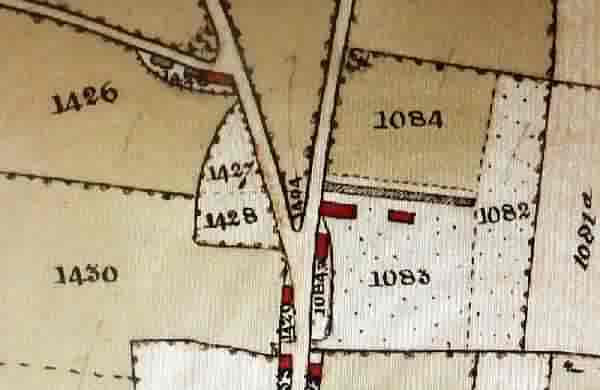
This extract of the 1842 Tithe Map shows the Ilchester Road coming from centre bottom before Marsh Lane splits off to the right. Parcel 1083, 'House Garden and Brickyard' (Picket Witch House), was owned and occupied by Charles Vining and then his son Richard Vining (2).
Gallery

The entry of Richard's 29 October 1815 baptism in St John's parish register.

From the 24 May 1853 edition of the Western Flying Post, announcing the near completion, by Richard Vining, of the Hendford Terminus - Yeovil's first railway station.
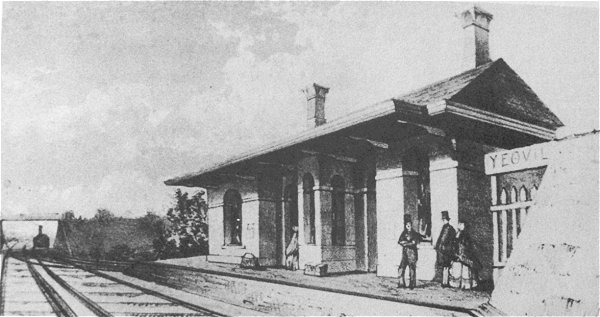
A sketch of the Hendford Terminus, Yeovil's first railway station, shortly after its opening. Built by contractor Richard Vining, it was to remain open to passengers for just 3 years, 4 months and 1 day.
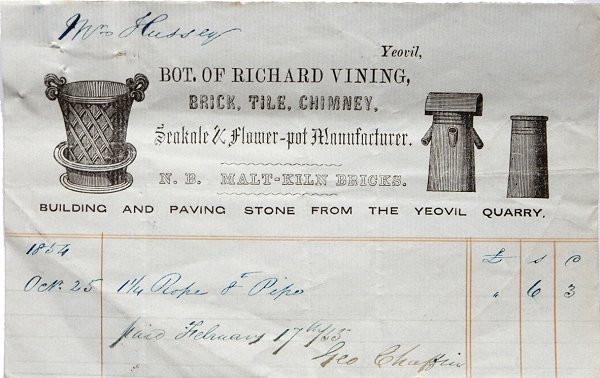
From my
collection
Invoice of Richard Vining dated 25 October 1854. Richard Vining was a brick, tile, chimney, seakale and flower pot manufacturer who also made malt kiln bricks and could supply building and paving stone from the Yeovil Quarry. He was listed in trade directories between 1840 and 1861 but committed suicide by drowning.
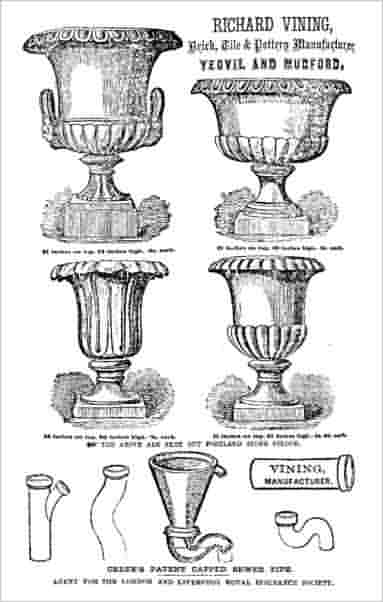
An undated advertisement for Richard Vining's wares - note that he operated from 'Yeovil and Mudford'.
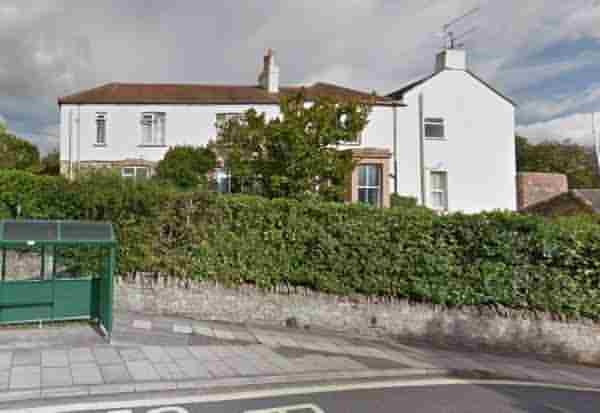
Picket Witch House, Ilchester Road, was the home of Charles Vining and then his son Richard Vining (2).
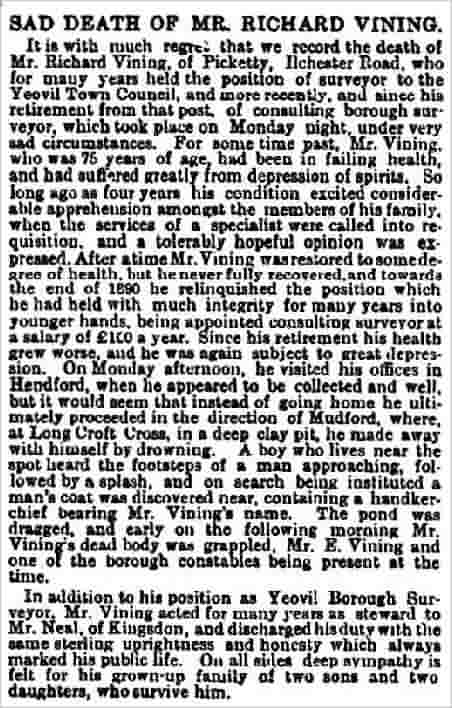
The report on Richard Vining's suicide from the 27 March 1891 edition of the Western Chronicle. The inquest jury returned a verdict "That deceased committed suicide in a fit of temporary insanity."
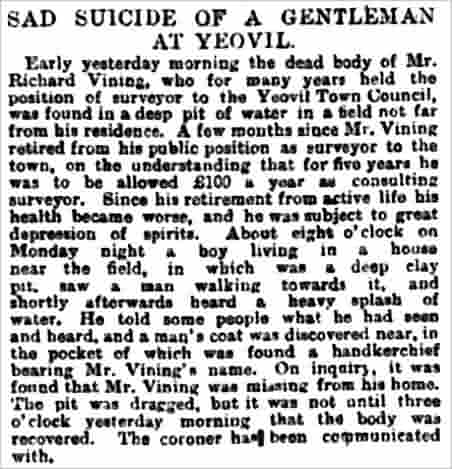
A similar report from the 25 March 1891 edition of the Bristol Times and Mirror.